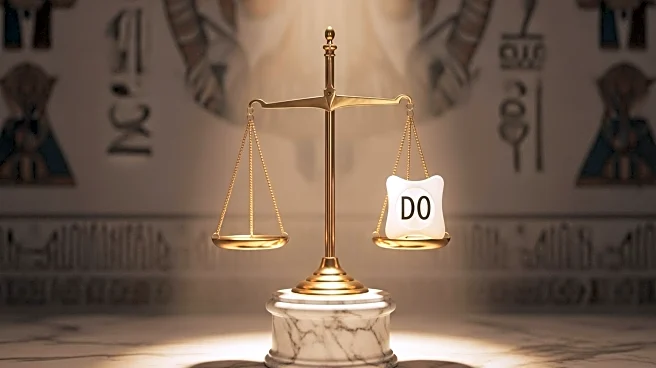What's Happening?
Egyptian President Abdul Fattah al-Sisi has pardoned Alaa Abd El-Fattah, a well-known British-Egyptian activist, who has been imprisoned for six years. Abd El-Fattah was convicted in 2021 for spreading false news after sharing a Facebook post about torture in Egypt. His release follows a request from the National Council for Human Rights and comes after his family staged hunger strikes to protest his imprisonment. Abd El-Fattah's lawyer confirmed the pardon, and he is set to be released from Wadi al-Natrun prison once the pardon is officially published. The decision marks a significant moment in Egypt's handling of political prisoners.
Why It's Important?
The pardon of Alaa Abd El-Fattah is a pivotal moment in Egypt's political and human rights landscape. Abd El-Fattah has been a prominent figure in the fight for democracy and human rights, and his release may indicate a shift in the government's stance on political dissent. The decision could impact Egypt's international relations, particularly with Western countries that have criticized its human rights record. It may also influence domestic politics, as activists and opposition groups assess the implications of Abd El-Fattah's release. The move could be seen as a response to international pressure, potentially affecting Egypt's diplomatic and economic engagements.
What's Next?
Following the pardon, Alaa Abd El-Fattah is expected to be released from prison, with his family eagerly awaiting his return. The National Council for Human Rights has welcomed the decision, suggesting a commitment to justice and fundamental rights. The international community may continue to scrutinize Egypt's human rights practices, potentially influencing diplomatic relations and foreign policy. The release of Abd El-Fattah could lead to increased advocacy for other political prisoners in Egypt, as human rights organizations push for broader reforms.
Beyond the Headlines
Alaa Abd El-Fattah's release highlights the ongoing struggle for human rights and political freedom in Egypt. His case underscores the challenges faced by activists in authoritarian regimes and the role of international advocacy in securing their freedom. The pardon may reflect internal political dynamics within Egypt, as President Sisi balances maintaining control with addressing international criticism. The long-term implications for Egypt's political landscape and civil society remain uncertain, as the government navigates pressures both domestically and abroad.











